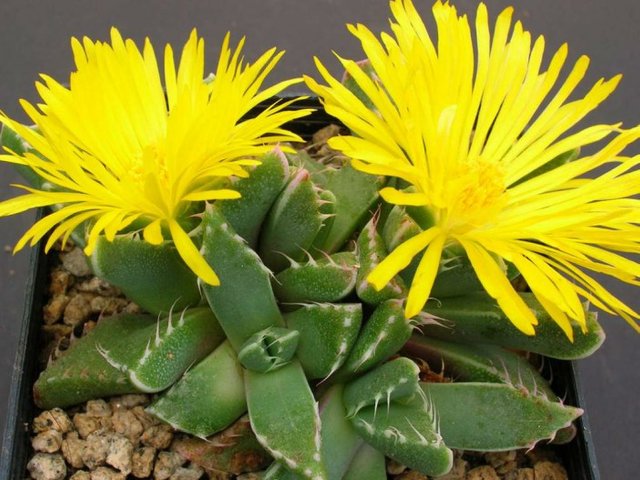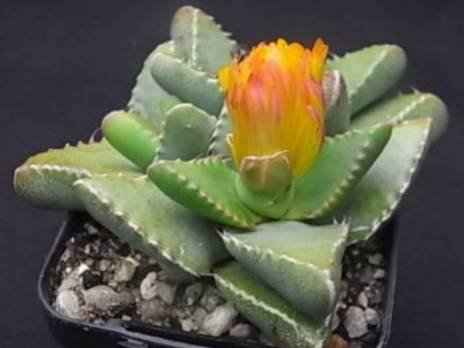Faucaria felina – Tiger Jaws, Cat Chap - Succulent
This is one of my seeds. See my proyect on https://steemit.com/crowdfunding/@webocel/58kd3g-my-dream-needs-your-vote-crowdfunding
Scientific Name
Faucaria felina (L.) Schwantes
Common Names
Tiger Jaws, Cat Chap, Cat Jaws, Wolf Mouth Mesemb

Synonyms
Faucaria acutipetala, Faucaria candida, Faucaria cradockensis, Faucaria crassisepala, Faucaria duncanii, Faucaria felina var. felina, Faucaria jamesii, Faucaria kingiae, Faucaria latipetala, Faucaria laxipetala, Faucaria longidens, Faucaria longifolia, Faucaria lupina, Faucaria militaris, Faucaria montana, Faucaria multidens, Faucaria plana, Faucaria ryneveldiae, Faucaria uniondalensis, Mesembryanthemum lupinum, Mesembryanthemum ringens var. felina
Scientific Classification
Family: Aizoaceae
Subfamily: Ruschioideae
Tribe: Ruschieae
Genus: Faucaria
Description
Faucaria felina is a compact leaf succulent forming unusual clumps of fleshy, boat-shaped, toothed leaves, up to 3 inches (7.5 cm) long and up to 1 inch (2.5 cm) wide. Faces of leaves are dark green to grey-green smooth or with white dots and crystals in the outer walls in certain areas resulting in white dots. Flowers are daisy-like, yellow to orange, up to 2 inches (5 cm) in diameter.Photo via suggestkeyword.com
How to Grow and Care
Faucarias are mostly spring and fall growers. They need good drainage but with a little shade they will do just fine even with extreme heat, although they do stop growing then, and they need water every few days. When they lack water, as many other mesembs, the stems die and some of the rosettes are not connected to the roots by any living tissue. When found in time, the rosettes can be used as cuttings and keep in the shade in a barely moist medium until the temperature cools down in the fall. They bloom for several months in in fall or the beginning of winter… – See more at: How to Grow and Care for Faucaria.
Origin
Native to South Africa.
Subspecies, Varieties, Forms, Cultivars and Hybrids
Faucaria felina subsp. tuberculosa


